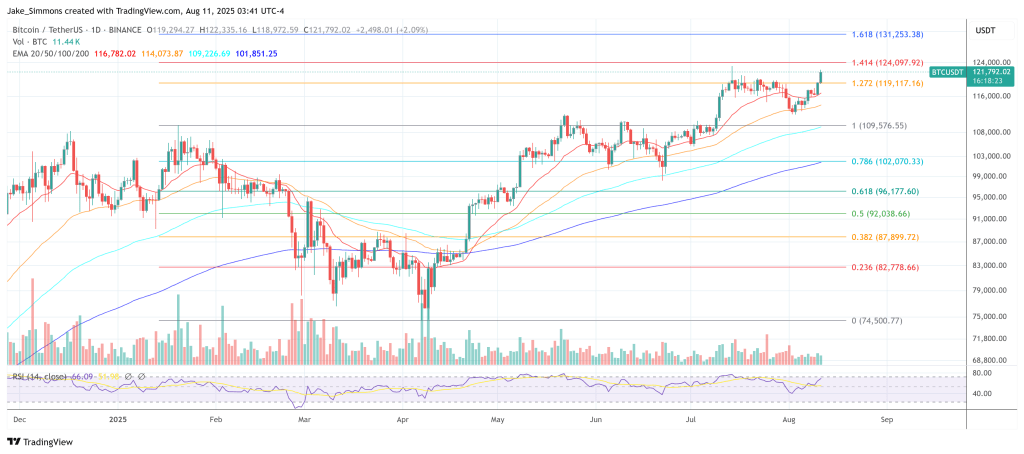Bo Hines’ abrupt exit over the weekend left a vacuum on the prime of the White House’s crypto equipment. But the Trump administration moved shortly. Patrick Witt is stepping in to run level on crypto coverage from the West Wing as Executive Director of the President’s Council of Advisors for Digital Assets, whereas persevering with to function Acting Director of the Pentagon’s Office of Strategic Capital (OSC).
Witt shouldn’t be a Twitter-native crypto influencer; he’s a coverage hand with one foot in nationwide safety and the opposite in crypto technique. The Defense Department lists him as Acting Director of OSC, the funding workplace stood as much as channel credit score into essential applied sciences.
Who Is Crypto’s New Leader In The White House?
If you need to know the way Patrick Witt thinks about Bitcoin, there’s just one place to look: his on-stage interview on the Bitcoin Policy Summit in late June—his sole public look to this point through which he immediately mentioned Bitcoin and crypto. In that dialog, Witt moved the Strategic Bitcoin Reserve (SBR) from slogan to mechanics. “We’ve already taken some steps with the SBR,” he mentioned. “How will we observe that up with the buildup plan?”
Witt’s rationale for an SBR was framed as statecraft, not hypothesis. “Bitcoin and the digital property ecosystem is an engine for financial development,” he argued, including that the administration “need[s] to be the crypto capital of the world.” He known as digital property “a device of contemporary statecraft,” warning that if the United States doesn’t “actively [shape] and affect what that new assemble seems like” for the next-generation monetary system, it dangers ceding benefit.
Crucially, Witt tied the reserve to an organized coverage pipeline relatively than a one-off announcement. Alongside the GENIUS Act and CLARITY, he referenced “the [now released] report on the interagency actions,” then returned to the SBR’s operational subsequent step—“the buildup plan.”
Why is Witt the particular person saying this? Because his second hat is executional. As Acting Director of the Pentagon’s Office of Strategic Capital (OSC), he described a federally backed credit score window designed to rebuild industrial capability and compete in strategic applied sciences. When he joined, OSC “had $984 million of capital to lend,” later increasing to “$5 billion the place we at the moment sit,” with potential—pending laws—to “develop to $200 billion.”
Demand already ran sizzling: the primary discover of funding drew “$9 billion price of requests,” eight to 9 instances the preliminary pool. Asked what would possibly intersect with Bitcoin, Witt was cautious however plain: OSC would goal “enabling infrastructure… doubtlessly extra on the power facet, compute energy. We need compute and power to be home, safe and ample.” Pair that with an SBR accumulation plan and a transparent image emerges: sovereign balance-sheet publicity to Bitcoin alongside public credit score that lowers the price of the bodily inputs miners and broader crypto infrastructure devour.
Witt additionally made the hierarchy specific. “We acknowledge the distinction within the area… Bitcoin undoubtedly has primacy for us,” he mentioned, even because the White House pushes broader digital-asset coverage. The request to trade was equally direct: be “a trusted accomplice and an goal useful resource,” carry analysis and credible tasks, and settle for that actual laws calls for “horse buying and selling and compromise.” That’s the sensible context for any SBR rollout: the West Wing will want private-sector experience to harden custody, automate execution, and publish clear reporting that markets can belief.
Bitcoin Softwar Thesis Playing Out?
This interview additionally lands squarely in a national-security dialog many in Bitcoin already know: Major Jason Lowery’s “Softwar” thesis. Lowery argues that proof-of-work is a non-kinetic type of energy projection that secures property in our on-line world—an energy-grounded deterrence mechanism. Witt by no means cites Lowery, however his vocabulary rhymes with it: Bitcoin as “statecraft,” home “mining” as precedence, capital markets as a national-security asset, and public credit score aimed toward power and compute.
It’s why some group response highlighted his twin roles—White House crypto lead and OSC chief—and urged, “If you haven’t learn ‘Software’ [sic] by Major Jason Lowery, you would possibly need to give it a go.” Whether or not the administration embraces Softwar’s strongest claims, Witt’s solely public remarks counsel the reserve is being handled as strategic infrastructure, not a speaking level.
Strip it down, and the sign is clear. The White House appears to have made a strategic pivot: it’s a strategic pivot. Trump’s Bitcoin and crypto plans are steered by somebody who views it not as an asset class however as essential infrastructure to be managed. Bo Hines received changed by a Pentagon-linked strategist.
At press time, BTC traded at $121,792.

Featured picture created with DALL.E, chart from TradingView.com

Editorial Process for bitcoinist is centered on delivering totally researched, correct, and unbiased content material. We uphold strict sourcing requirements, and every web page undergoes diligent evaluation by our group of prime expertise specialists and seasoned editors. This course of ensures the integrity, relevance, and worth of our content material for our readers.











